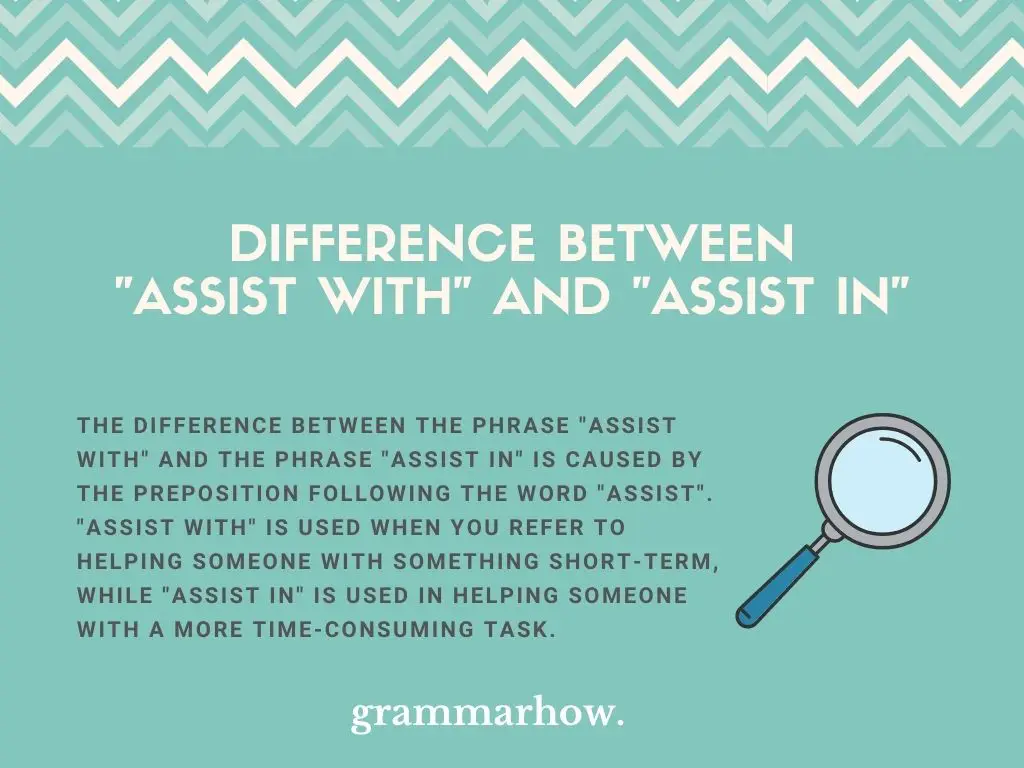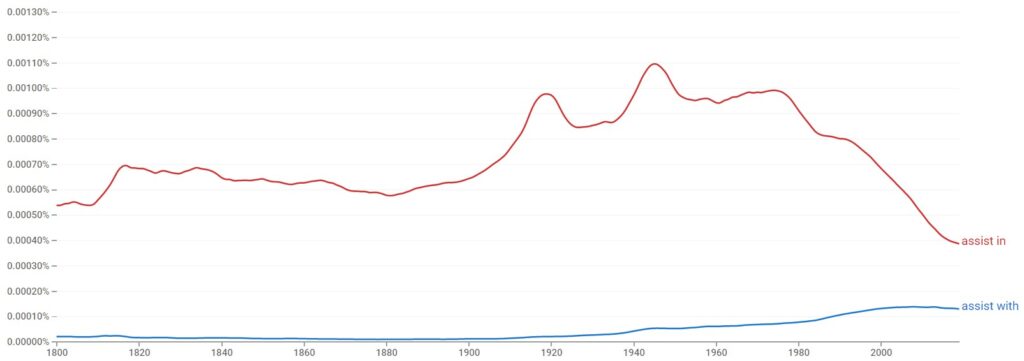Knowing the nuances of prepositions can help you to choose the correct one in your statements when discussing how you can help someone. This article will help you understand the differences between the phrases “assist with” and “assist in” and how to use them.
What Is The Difference Between “Assist With” And “Assist In”?
The difference between the phrase “assist with” and the phrase “assist in” is caused by the preposition following the word “assist”. “Assist with” is used when you refer to helping someone with something short-term, while “assist in” is used in helping someone with a more time-consuming task.

A preposition is a word that can change the meaning of a verb, such as an action like “assist”. In this case, the prepositions being discussed are “with” and “in’. These prepositions cause the phrases “assist with” and “assist in” to be similar in meaning, but can create a distinct difference.
Using “assist in” can clarify that you are helping someone with something, such as a project or task, that can be more time-consuming. On the contrary, using the phrase ‘assist with” can indicate you are helping someone with something very briefly.
What Does “Assist With” Mean?
The phrase “assist with” is used when you want to clarify that you are giving someone assistance with something or helping them on a quick task. An example of this would be if you were to assist someone in moving something to a different room.
“Assist with” is used when you will be helping someone with a short-term task or project that will not take a long time to accomplish. This is usually helping someone out with a physical task, such as moving something or something in which you have no personal stake in the event happening.
Here are some great reference examples on how to correctly use the phrase “assist with” in a sentence.
- Our team can assist with the categorization of the data between the two departments.
- A travel agent can help assist with all sorts of planning that can be confusing and time-consuming when it comes to booking a trip.
- The band partnered with the charity in order to assist with gathering donations to help the cause they cared about.
- Another surgeon has been assigned to assist with your procedure next week.
- She was asked to assist with the distribution of juice to the class.
What Does “Assist In” Mean?
When you are looking to describe your involvement in something, ask for help on a project, or are assigning teams for something, using the phrase “assist in’ can relay what you mean. “Assist with” is used to describe the act of assisting someone with a task or project you are involved with long-term.
The phrase “assist in” is most commonly used when describing one’s involvement in a project in which they are invested in. Projects such as this typically have a moderate to long-term time frame.
Using references can help you to understand how to use the phrase “assist in” correctly.
- Since the two of them shared a desk, they would assist in each other’s work for the foreseeable future.
- You two are going to assist in cleaning up the entire beach for the next two months for your community service sentence.
- Japan had planned to assist in the war currently happening, joining the side of Germany and Italy.
- He took his paternal leave in order to assist in the child-rearing duties with his wife now that their little girl was home.
- As a student teacher, she was expected to assist in classes and help students when they had questions.
Are “Assist With” And “Assist In” Interchangeable?
The phrases “assist with” and “assist in” can be interchangeable, but do have different meanings. In American English, the meaning of these two phrases is close enough to be understood by the vast majority of the population if used incorrectly or interchangeably.
American English is a language filled with phrases that are exceedingly similar to one another, such as “assist in” and “assist with”. Because these two phrases are so similar, most people will not understand the nuances between them and they will be used interchangeably quite often.
Is “Assist With” Or “Assist In” Used The Most?
Between the phrase “assist with” and “assist in”, the latter phrase of “assist in” is used the most according to this helpful Google Ngram Viewer graph comparing the usage of the two phrases over time. It has always been used much more frequently than “assist with”.

While the phrase “assist in” has always been used much more than “assist with”, it reached its peak during the 1910s through the 1960s and has been on a decline in usage since then. “Assist with” has always maintained a rather low but steady usage over time.
Which Other Prepositions Can Be Used After “Assist”?
The prepositions “in” and “with” are not the only prepositions that can be used with the word “assist” to modify its meaning. Other prepositions, such as “on” and “at” can also be used.
Assist On
By adding the preposition “on” to the word “assist”, you can create a phrase that can be used to ask for help for someone else. This phrase is used most often in the past tense, being used as “assisted on” to refer to the act of having helped someone previously.
Here are a few examples of how to use “assist on” correctly in a sentence.
- Having experience in a kitchen previously, she was able to assist on the dinner rushes when she was scheduled to work.
- He had assisted on the development of the code that allowed their gaming software to run functionally.
Assist At
Adding the preposition “at” to the word “assist” changes the meaning of the word by creating a location for the action of assisting happens to be occurring at. The new phrase, “assist at”, describes the actions of someone helping with something at a different location.
Provided below are some helpful sentences to reference for the correct usage of “assist at” in a sentence.
- She had volunteered to assist at the lumberyard.
- He was going to assist at the community center and help kids with their homework.
You may also like:
“Help With” or “Help In” – Difference (With Examples)
“On This Matter” or “In This Matter” – Difference (With Examples)

Martin holds a Master’s degree in Finance and International Business. He has six years of experience in professional communication with clients, executives, and colleagues. Furthermore, he has teaching experience from Aarhus University. Martin has been featured as an expert in communication and teaching on Forbes and Shopify. Read more about Martin here.
